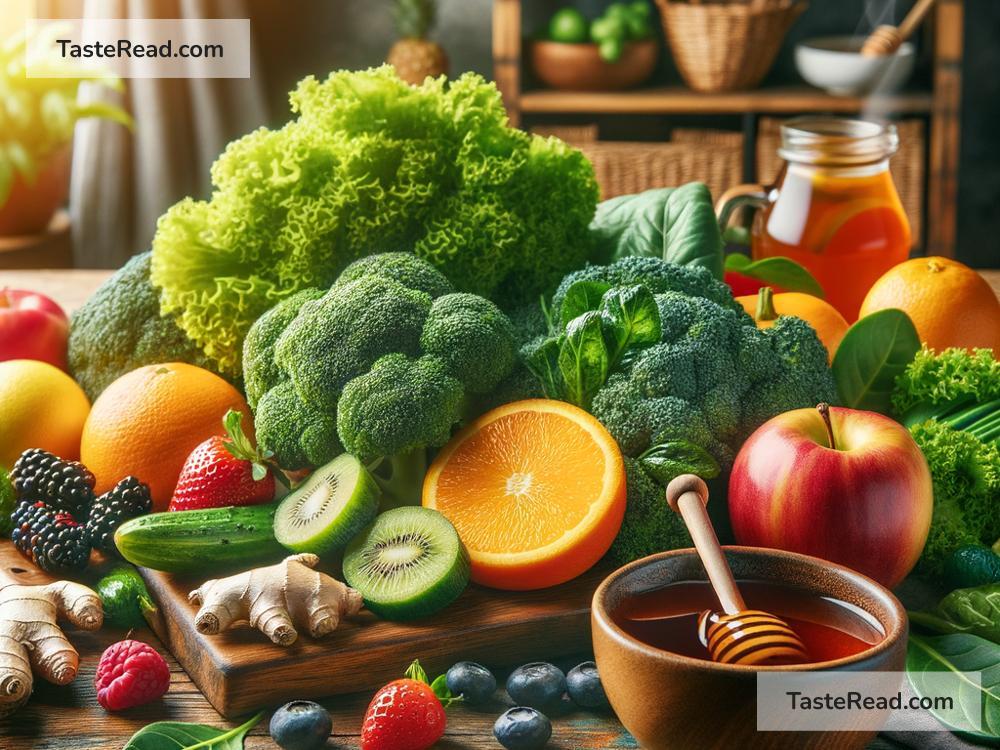Foods That Reduce the Risk of Tracheitis
Tracheitis is inflammation of the trachea, also known as the windpipe, which carries air from the nose and throat into the lungs. This condition can lead to coughing, throat pain, difficulty breathing, and other uncomfortable symptoms. It’s often caused by infections, irritants like allergens or pollutants, or weakened immunity. While proper medical treatment is necessary for severe cases, maintaining a healthy diet can help reduce the risk of tracheitis and strengthen the body’s ability to fight off infections.
Some foods support respiratory health by reducing inflammation, boosting immunity, and promoting overall wellness. In this article, we’ll explore foods you can include in your diet to lower the chances of developing tracheitis and keep your respiratory tract healthy.
1. Foods Rich in Vitamin C
Vitamin C plays a key role in boosting immunity and reducing inflammation in the respiratory system. It helps the body fight off harmful bacteria and viruses that could lead to tracheitis.
Examples of Vitamin C Foods:
- Citrus fruits like oranges, lemons, grapefruits, and limes
- Berries such as strawberries, blueberries, and raspberries
- Kiwi – one of the highest sources of vitamin C
- Bell peppers – especially red and yellow varieties
- Broccoli and spinach
Adding these foods to your meals can give your body the tools it needs to stay healthy and fight off infections.
2. Honey
Honey has natural antibacterial and anti-inflammatory properties that can soothe the respiratory system and protect against infections. Its smooth texture can also coat the throat, providing relief from irritation. Honey helps support the immune system and is often used to calm coughs and minimize inflammation.
How to Use Honey:
- Stir it into warm water or herbal tea for a soothing drink.
- Mix it with lemon juice for added vitamin C benefits.
- Use it in recipes as a natural sweetener.
3. Garlic and Ginger
Garlic and ginger are powerful foods that help boost immunity and fight inflammation. Both of these ingredients contain compounds with antimicrobial properties, making them effective at reducing the risk of infections like tracheitis.
- Garlic contains allicin, which offers antiviral and antibacterial benefits.
- Ginger contains gingerol, which has anti-inflammatory effects and can soothe irritation in the respiratory tract.
How to Eat Garlic and Ginger:
- Add them to soups, stir-fries, or salad dressings.
- Brew ginger tea with fresh ginger slices for a warming drink.
- Roast garlic and spread it on toast for a delicious side dish.
4. Turmeric
Turmeric is a bright yellow spice that contains curcumin, a compound known for its strong anti-inflammatory and antioxidant properties. It can help reduce swelling and irritation in the trachea, making it a great addition to your diet to lower the risk of tracheitis.
Ways to Include Turmeric:
- Sprinkle it into smoothies, soups, or sauces.
- Mix it with warm milk to make a golden latte.
- Add it to rice or roasted vegetables for extra flavor.
Make sure to pair turmeric with a small amount of black pepper to increase curcumin absorption in the body.
5. Foods with Omega-3 Fatty Acids
Omega-3 fatty acids are essential fats that help protect against inflammation in the body, including the respiratory system. These healthy fats support lung health and improve the immune response.
Foods Rich in Omega-3:
- Fatty fish like salmon, mackerel, and sardines
- Walnuts – great as a snack or in salads
- Chia seeds and flaxseeds – perfect for smoothies or oatmeal
- Soybeans and tofu
Aim to include omega-3-rich foods in your weekly meals for long-term respiratory health benefits.
6. Leafy Green Vegetables
Vegetables like spinach, kale, and swiss chard are packed with vitamins, minerals, and antioxidants that support immunity and overall respiratory wellness. Magnesium, which is found in these greens, helps relax the muscles in the respiratory system, making breathing easier and lowering the risk of irritation in the trachea.
Cooking Ideas:
- Make a fresh salad with spinach and kale.
- Sauté leafy greens with olive oil and garlic.
- Add them to smoothies for an extra dose of nutrition.
7. Probiotic-Rich Foods
Probiotics, the “good bacteria” found in certain foods, help support gut health, which in turn directly impacts overall immunity. A strong immune system reduces the risk of infections like tracheitis.
Sources of Probiotics:
- Yogurt with live cultures
- Kefir, a type of fermented milk drink
- Fermented vegetables like sauerkraut or kimchi
- Miso and tempeh (fermented soy products)
Adding probiotics to your diet regularly will help your body stay strong and resilient against respiratory infections.
8. Water and Herbal Teas
Staying hydrated is crucial for maintaining the health of your respiratory system. Water helps thin mucus, making it easier for your body to expel irritants or pathogens. Herbal teas like chamomile, peppermint, and licorice root can also soothe the throat and prevent irritation in the trachea.
Make sure to drink plenty of fluids throughout the day to keep your trachea moisturized and healthy.
Final Thoughts
While tracheitis can be a troublesome condition, adopting a healthy diet rich in immune-boosting and anti-inflammatory foods can significantly reduce your risk. Incorporate foods like citrus fruits, honey, garlic, ginger, turmeric, fatty fish, leafy greens, and probiotics into your meals for long-term respiratory health. Additionally, don’t forget to stay well-hydrated, get enough rest, and avoid irritants like smoke or pollutants wherever possible.
A strong, balanced diet goes a long way in keeping your respiratory system healthy and protecting you from infections like tracheitis. Start adding these foods to your plate today to breathe easier tomorrow!


